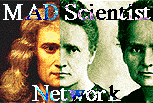|
|
NSC111: Physics/Earth/Space
|
I. How science worksA. The Scientific MethodScience is often characterized by a rigid, linear scheme called "the scientific method." This entails several steps, for example
As a frequent science fair judge, I see every project jammed into this mold, whether it fits or not. This view of science is at least a myth, if not an outright lie. For more detail, see the reserve articles.
Science is not really a linear process. The steps given above can be fitted nicely into a circular pattern, as shown. One can and does enter the circle from any point: from inside if one already has ideas about how the world works, or from the outside if one is simply trying something to see what happens. A good deal of productive work has resulted from the question "What would happen if...?" Chance favors the prepared mind. Guiding scientific practiceSome of the assumptions involved in measurement, and in science in general, are
These assumptions guide the practice of science, and may even be said to govern what is the domain of science and what isn't. For example, if after study there is no discernible pattern to a set of events, and no discernible natural cause, the events in question are normally considered to be beyond the scope of science. Many scientists will say that such events are nonsense; others will continue to try to address them using the assumptions of science, believing that there must be some natural cause and some regularity to the events. Many things once thought to be inexplicable have eventually been shown to result from natural and predictable causes. Any scientific question or topic usually has at least three components: reproducibility, explanatory power, and falsifiability.
 For further discussion, see this reserve article.
For further discussion, see this reserve article.
Is it basic or applied science?People normally talk about "basic research" -- in which scientists pursue a problem for its own sake, without worrying about applicability -- and "applied research" -- in which solutions to particular "practical" problems are sought. But this is a false dichotomy: the two go hand in hand. I think there is another another possible way of classifying research: "thought-driven research," in which a scientist uses known theory or experiment to predict a result, then goes to find it; and "technology-driven research," in which a scientist gets a new piece of equipment and sees how it applies to her particular problems, or just what it will do. Again, these types usually overlap. See this reserve article on the interplay between science and techology. Further readingFor more, see the following articles:
|
|
Copyright © 2001 by Daniel J. Berger. This work may be copied without limit if its use is to be for non-profit educational purposes. Such copies may be by any method, present or future. The author requests only that this statement accompany all such copies. All rights to publication for profit are retained by the author. |